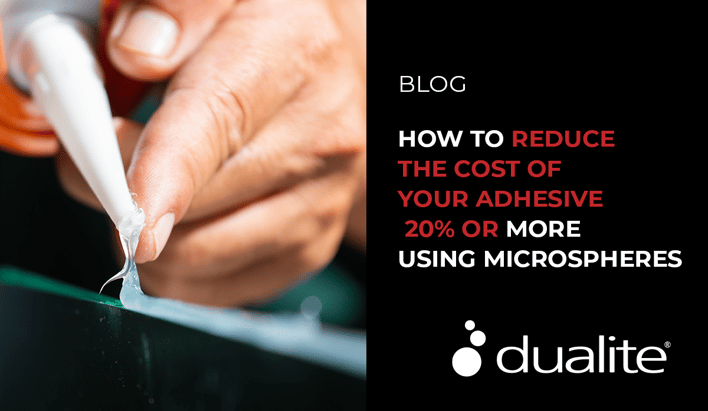There are several types of microspheres available, each with its own advantages and disadvantages...
How to Reduce the Cost of your Adhesive 20% or More Using Microspheres

The market for adhesives is very competitive. It is difficult to reduce the density/cost of your adhesive without affecting the quality and performance of the adhesive. Using glass microspheres is an option, but low-density glass microspheres are not sprayable and can break during mixing, resulting in increased density and cost. Other rigid lightweight fillers can have a negative effect on your adhesive’s physical properties.
Dualite Microspheres have an organic thermoplastic shell that encapsulates a low boiling point hydrocarbon. They are available in both expanded and unexpanded grades.
There are several reasons why you should consider Dualite Microspheres in your current or future adhesive application.
- Volume Cost – Because of the microsphere's low density, they have a very low volume cost. Depending on the microsphere used, they can have a gallon cost in the low $2.00 per gallon range. The typical loading level is 1-3 % by weight of your formula. This loading level can extend your volume by 20% or more.
- Ultra Low Density – The E Grades range in density from 0.30 g/cc up to 0.135 g/cc. They have either an acrylonitrile copolymer (ACN) shell or a polyvinylidene( PVDC) shell with a small amount of hydrocarbon gas in the center. The shell is coated with calcium carbonate or aluminum trihydrate which keeps the microspheres from being a dust explosion hazard.
- Micron Size – The E Grade beads range in micron size from 25 microns up to 150 microns. In some adhesives, the visual texture of the adhesive is important, so you would need a 50-micron or less microsphere.
- Unexpanded Dualite – Polymeric microspheres can be used as a blowing agent in gap-filling adhesives or cost reduction initiatives. Heat is needed in your application or process to expand the microspheres. Our microspheres come either in wet form (75% solids) or dry form (97% solids). Part of the selection process is dependent upon the temperature at which the microspheres expand. This expansion temperature is characterized by the Tstart and Tmax. Tstart is the temperature at which the microspheres start to expand and Tmax is the temperature at which they reach their maximum expansion. Currently, our lowest has a 95C Tstart and a 130 Tmax. Other ranges are available up to a maximum of 280C Tstart and 295C Tmax. These beads are very robust in their unexpanded state and are not coated. In the unexpanded state, they have a 5-45 micron size and can expand up to 60 times their original size.
- Shear Stable –Dualite Microspheres are flexible, making them very shear stable. They are pumpable and sprayable and the expanded grades have a PSI rating up to 2,500 depending on the microsphere. Unlike glass microspheres, if Dualite microspheres rupture, they will not increase your density/cost or degrade your pump seals.
- Substrate Surface – With a porous substrate, adhesives have a tendency to “dive” into the surface resulting in using more adhesive or poor bond strength. The use of Dualite can help prevent this occurrence in many applications.
- Other Benefits – Provides: Thermal insulation, impact resistance, hiding power, sound damping and are three-dimensional.
Related article: Pumping vs Dumping Microspheres: What's Best for You





